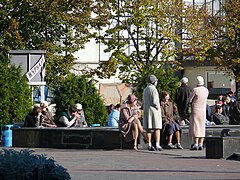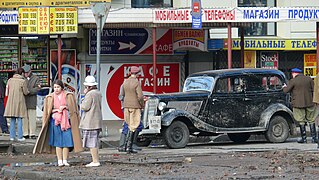Dau (film)
| Movie | |
|---|---|
| German title | Dau |
| Original title | Dau |
| Country of production | Russia |
| original language | Russian |
| Rod | |
| Director | Ilya Chrschanowski |
| production | Phenomen Films |
| camera |
Manuel Alberto Claro , Lol Crawley Jürgen Jürges |
Dau is a film project by the Russian director Ilya Chrschanowski . The film is about the life of the Soviet physicist and Nobel Prize laureate Lev Dawidowitsch Landau (1908–1968, nickname Dau) and the Stalin era. The film is one of Russia's largest and most controversial film projects.
Emergence
The preparatory work for the film began in 2005, the shooting started in 2008 and lasted over three years. During this time, more than 700 hours of film material were produced, from which 13 feature films and a large number of TV series have now been cut. The writer Wladimir Sorokin , originally intended as a screenwriter, left the project after differences in content. The project sponsor is the Russian entrepreneur Sergei Adonjew from St. Petersburg . The world premiere was planned for the 2011 Cannes International Film Festival , but had to be postponed.
The film was made in various locations in Russia , Ukraine , Germany , Great Britain and Denmark . The film was mainly made in the "Institute" in Kharkiv in northeastern Ukraine, where Landau lived and taught from 1932 to 1937. With a total area of 12,000 square meters, the institute was the largest film set in Europe, a laboratory and its own urban quarter in which up to 400 people lived between 2009 and 2011. The set was a dynamic creative reconstruction of the top-secret "Institute for Physical Problems of the Soviet Academy of Sciences" from 1938–1968 based in Moscow. Cut off from the modern world, they lived and worked in a secret scientific institute for over two years. They discovered a familiar and yet alien reality, crossed borders, both personal and scientific. Some actors lived permanently in their role in the institute 24 hours a day, and several children were created on the set.
Participants include the conductor Teodor Currentzis , who plays the title role, and Radmyla Shchoholewa , the only professional actress, plays his wife. Alexei Blinov led the technical development of the feature film and acted as Prof. Blinow. Also involved: cameraman Jürgen Jürges , the composer Brian Eno , the performance artist Marina Abramović , the director Romeo Castellucci , Massive Attack , Anatoli Wassiljew , Dmitri Tschernjakow , Olga Schkabarnja , Peter Sellars , Carsten Höller , David Gross , Shing-Tung Yau , Nikita Nekrasov , Carlo Rovelli , James H. Fallon , and others.
Since July 2018 there has been a project page on which the project is briefly outlined and you can register to receive further information.
- Pictures from the shooting in Kharkiv
DAU Freiheit - A Berlin Art Project
In August 2018 it was announced that the art project would be presented as a city installation by the Berlin Festival . In the period from October 12 to November 9, 2018, an adventure room was to be installed around the Kronprinzenpalais , around which a replica of the Berlin Wall was to be drawn. At the same time, the world premieres for the 13 films and several series that were made from the film material were to take place here. The Berliner Festspiele, as the organizer, presented the project as a "social experiment that will change the perception of Berlin": "In the middle of the city center, which is currently characterized by various building projects, a temporary wall will mark a zone that will become one for four weeks It becomes a special experience space and at the same time opens up historical echo spaces that, 29 years after the fall of the Berlin Wall, offer the opportunity to open a political and social debate about freedom and totalitarianism, surveillance, coexistence and national identity.
The four-week Berlin presentation was designed under the motto "Freedom", with sequels from November 23, 2018 in Paris on the topic of "Fraternity" and in early 2019 in London on the catchphrase "Equality".
In the opinion of those affected, the project was applied for at very short notice from the responsible authorities. For this reason and for basic considerations, some of the planned institutions have canceled their participation ( German State Opera whose underground car park was to be used to access the area, St. Hedwig's Cathedral , Barenboim-Said Academy ). The project was discussed very controversially, also because director Chrschanowski did not appear personally. The project is supported by Berlin's Governing Mayor Michael Müller , Senator for Culture Klaus Lederer , director Tom Tykwer and State Minister for Culture Monika Grütters .
Provisional rejection by the Berlin authorities
On September 21, 2018, Transport Senator Regine Günther and District Councilor Sabine Weißler confirmed the cancellation of the project for safety reasons. The main concerns were traffic safety and fire protection. For events of this magnitude, a lead time of about a year is normally required, said District Councilor Weißler, but the first specific planning documents were only received six weeks before the event. “It was a mixture of amateurism and arrogance,” said the administration. The rejection was regretted by many, including Minister of State for Culture Monika Grütters, Governing Mayor Michael Müller and Senator for Culture Klaus Lederer.
Installation in Paris
Paris is planned as the next stop for the art project. Here, too, the preparations are top secret.
In the Théâtre du Châtelet , which will be remodeled during the scheduled season (January 24, 2019 - February 17, 2019), rooms have been set up for the immersive installation. These include silicone figures that are more realistic than lifelike, stuffed animals and Soviet posters of Lenin's fame. Originally, a 15 m high bridge was to be built between the Châtelet and the Théâtre de la Ville and should also be part of the installation. Seven screening rooms will be set up within the two locations, in which thirteen films in Russian (from 1:30 a.m. to 2:30 a.m.) will be shown without subtitling and made by Ilya Chrschanowski. It should offer 400 visitors simultaneous access to Chrschanowski's immersive installation. The participants should experience the work of art around the clock. The voiceover comes from French actors like Isabelle Adjani , Gérard Depardieu or Isabelle Huppert . Approval from the city of Paris for the project is still pending.
- Installation in Paris
Awards
With the feature film DAU that resulted from the project . In 2020, Natasha Chrschanowski competed for the first time for the Golden Bear , the main prize of the Berlinale, together with co-director Jekaterina Oertel . The documentary DAU, made by Chrschanowski and Ilja Permjakow, was presented at the same time at the festival . Degenerazija (DAU. Degeneration) invited to the Special Gala section .
Web links
- Dau in the Internet Movie Database (English)
- Berliner Festspiele - DAU Freiheit ( Memento from September 28, 2018 in the Internet Archive )
- DAU - Freedom: An Installation by Ilya Khrzhanovsky ( Memento from September 14, 2018 in the Internet Archive )
- Saskia Trebing: Planned construction of the wall in Berlin: Who is Ilya Khrzhanovsky and what is his secret project "DAU"? In: monopol-magazin.de. August 22, 2018. Retrieved September 13, 2018 .
- NPR: The Never-Ending Film. In: npr.org. December 12, 2014, accessed September 13, 2018 .
- Experiment is ongoing. DAU project page. In: dah.xxx. Retrieved September 13, 2018 .
Individual evidence
- ^ The Never-ending Story. In: caravanmagazine.in. June 20, 2018, accessed September 13, 2018 .
- ↑ a b Dau-Connection in focus: Who is behind the Berlin Wall project? In: tagesspiegel.de . August 23, 2018, accessed September 13, 2018 .
- ↑ Apocalypse Dau: the most insane film shoot of all time, and why you may never get to see it. In: telegraph.co.uk. April 13, 2017, accessed September 13, 2018 .
- ↑ DAU - Freedom: An Installation by Ilya Khrzhanovsky -. In: visitberlin.de. Retrieved September 13, 2018 .
- ↑ Totalitarianism and Carnival in the DAU Project. Retrieved February 15, 2019 .
- ↑ Dau almost done ( Memento from November 16, 2011 in the Internet Archive )
- ↑ Planned construction of the wall in Berlin: Who is Ilya Khrzhanovsky and what is his secret project "DAU"? In: monopol-magazin.de. August 22, 2018. Retrieved September 13, 2018 .
- ↑ www.DAU.xxx
- ↑ Berliner Festspiele: Berliner Festspiele - Specials: DAU Freiheit. Retrieved January 2, 2019 .
- ^ Project DAU "Freedom". In: berlin.de. August 21, 2018, accessed September 13, 2018 .
- ^ Art project "Dau": Why you should build a wall again in Berlin. In: welt.de . September 13, 2018, accessed September 13, 2018 .
- ↑ Home: Art project «Dau» prohibited for security reasons. In: berlin.de. September 21, 2018, accessed September 27, 2018 .
- ^ Felix Hackenbruch: Controversial art project: Why "Dau" failed in Berlin in 2018. In: tagesspiegel.de . September 21, 2018, accessed September 27, 2018 .
- ↑ Peter Neumann: Art project "Dau": City councilor sees no chance of building the Wall this year. In: berliner-zeitung.de. September 26, 2018, accessed September 27, 2018 .
- ↑ Ulrich Zawatka-Gerlach: Reactions to the end for "Dau": Grütters calls for more courage to experiment. In: tagesspiegel.de . September 21, 2018, accessed September 27, 2018 .
- ↑ Tanja Kuchenbecker and Rüdiger Schaper: After the wall artwork failed in Berlin: "Dau" campaign moves on to Paris. In: tagesspiegel.de . September 21, 2018, accessed September 27, 2018 .
- ↑ Nicolas Maviel: Un pont gigantesque pour une oeuvre d'art éphémère place du Châtelet à Paris. In: leparisien.fr. September 24, 2018, accessed January 3, 2019 (French).
- ↑ Iris Radisch: DAU project: The other universe . In: The time . Hamburg January 24, 2019 ( zeit.de [accessed January 25, 2019]).
- ↑ Eric Le Mitouard: Paris: au Châtelet, prenez votre visa pour la Russie. In: leparisien.fr. November 6, 2018, accessed January 3, 2019 (French).
- ^ Eberhard Spreng: Art project failed in Berlin: DAU comes to Paris. In: tagesspiegel.de . January 2, 2019, accessed January 3, 2019 .
- ^ The competition of the 70th Berlinale and final selection of the Berlinale Special . In: berlinale.de, January 29, 2020 (accessed January 29, 2020).








